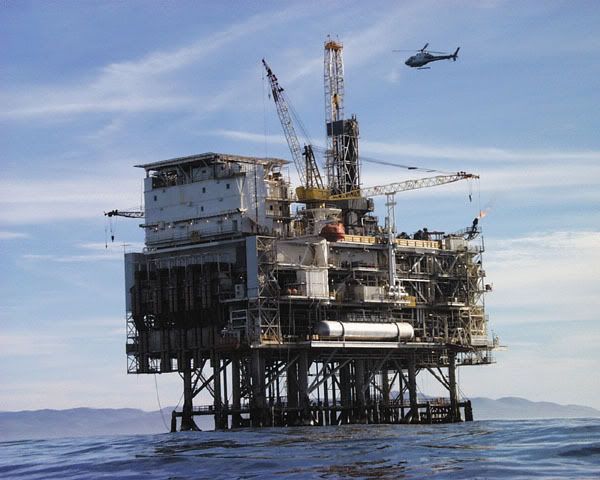A beholden Congress gives in to Big Oil on offshore drilling
 House leaders announced yesterday that they plan to let a quarter-century ban on expanded offshore oil drilling expire next week, and the Senate is expected to follow suit, the Associated Press reports:
House leaders announced yesterday that they plan to let a quarter-century ban on expanded offshore oil drilling expire next week, and the Senate is expected to follow suit, the Associated Press reports:
"The White House has made it clear they will not accept anything with a drilling moratorium, and Democrats know we cannot afford to shut down the government over this," said Jim Manley, a spokesman for Senate Majority Leader Harry Reid. "We look forward to working with the next president to hammer out a final resolution of this issue."
The House had planned to add a provision extending the moratorium to an emergency spending bill that's expected to be considered as soon as today. But with strong opposition to the provision from the majority of Republicans and many Democrats, the leadership was reluctant to risk a government shutdown with elections approaching.
The moratorium's expiration does not mean new drilling would begin immediately. The Interior Department's current five-year leasing plan includes potential leases off the Virginia coast, but the state would first have to agree to energy development -- and it's unlikely to do so unless Congress agrees to share federal royalties, the AP notes.
Last week the House approved a compromise measure allowing limited new drilling off the nation's coasts with the agreement of the states. It passed along largely partisan lines, with most Democrats favoring it and most Republicans opposing it because they felt its drilling allowances were too limited. Also last week, a bipartisan drilling measure being considered in the Senate was pulled because of the contentious politics surrounding the issue.
The oil and gas industry has been investing heavily in politicians, contributing more than $17 million to federal candidates and parties this election cycle, according to the nonpartisan Center for Responsive Politics (CRP). It's substantially increased donations to Democrats, who have received 26 percent of the industry's money this go-around -- up from 18 percent in the last cycle.
The industry is also spending generously to influence the presidential race. After Republican candidate Sen. John McCain reversed his longtime opposition to expanded offshore drilling this summer, contributions from oil and gas interests gushed into his coffers, according to an analysis by the Public Campaign Action Fund.
And while Democratic candidate Sen. Barack Obama has accused McCain of being too cozy with Big Oil, he has also received substantial contributions from the industry. In fact, CRP found that while McCain has raised three times more money from the industry, Obama is the favored candidate of executives from several of the biggest companies, including ExxonMobil.
McCain has said he would make expanded offshore oil drilling a priority if elected president, while Obama has said he would support expanded drilling in certain areas -- including the South Atlantic -- if it is part of a comprehensive energy plan to shift the U.S. away from oil to alternative fuels and greater efficiency.
Tags
Sue Sturgis
Sue is the former editorial director of Facing South and the Institute for Southern Studies.
